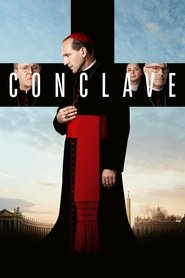— Tedesco will undo 60 years of progress!
Caught between either being not serious or not silly enough, Conclave then gets progressively pulpier as it goes on, which wouldn't be a problem per se except that it fits awkwardly into the sardonic seriousness offered in its opening act. Perhaps it's more tortured by the twin memories of The Da Vinci Code (2006) and The Two Popes (2019)?
The other big issue is more how the film layers on its rather grating liberal message of tolerance and acceptance using soaring sub-Sorkinesque speechifying (Et Occidens Alam..?), which is then contrasted with pantomime villains of reactionary opinion. Now that I think of it, not at all unlike the 'Bad Warwonger German General' character in Berger's previous All Quiet on the Western Front (2022).
Fiennes and Tucci turn out really respectable and actually memorable performances; the former world-weary and the latter engagingly warm. But the script has some obvious defects for a $20 million dollar movie, particularly in the mea culpa explanations of the cardinals exposed over the course of the election, as well as clunky ways to inform the audience of the how various parts of the conclave works. (One place it does credit the audience is that there is no cringeworthy TV news footage explaining what the black smoke means.) Also of issue is that much of the cardinals' backstories is neither unexplored nor utilised. Of note, however, is that the script manages to integrate a surprisingly diverse cast despite the film essentially being about a bunch of old guys locked in a room — all the more evidence that this is run for an Oscar in 2025. Fiennes' Oscar is well overdue at this point, but it would be a shame for him to receive it for this.
On the question of the script, however, there's a moment late in the film (before the silly and actually completely unnecessary 'contemporary twist') where the selected cardinal is twice asked a pivotal "yes or no" question in front of the rest of the cardinalate. The film would immediately gain more respect in my eyes if they gave the opposite answer at the point… Or the film simply ended with the question in the air á la Polanski's Knife in the Water (1962).
Lastly, for those even remotely interested in some of the parallels to actual factions within the contemporary Catholic Church and how it has been updated since Robert Harris' 2016 book (and thankfully not too much quibbling about the film's accuracy), the review in The Spectator is well worth a read.
In its final moments, Conclave repeats the mistakes of its characters and shows more ambition than it’s capable of pulling off. […] Making a religious thriller with no trace of holiness is encouraged; failing to meet the spiritual demands of the material is a greater sin.
— Rory Doherty (Paste Magazine)
No matter how didactic the movie’s writing might be (read: very), Conclave is never dull. And while the tension between idealism and realpolitik might be thin and superficial, the pettiness of it all is as much of a feature as a bug in a story about a group of old and/or aging holy men whose little red skullcaps can’t disguise the fact that they’re still bullying each other in the cafeteria. For a film that doesn’t get much deeper than “power should only be entrusted to those who don’t covet it for themselves,” Conclave finds something kind of sweet and adorable in the idea that its wizened characters still don’t know themselves completely.
— David Ehrlich (IndieWire)
Synopsis: After the unexpected death of the Pope, Cardinal Lawrence is tasked with managing the covert and ancient ritual of electing a new one. Sequestered in the Vatican with the Catholic Church’s most powerful leaders until the process is complete, Lawrence finds himself at the center of a conspiracy that could lead to its downfall.

